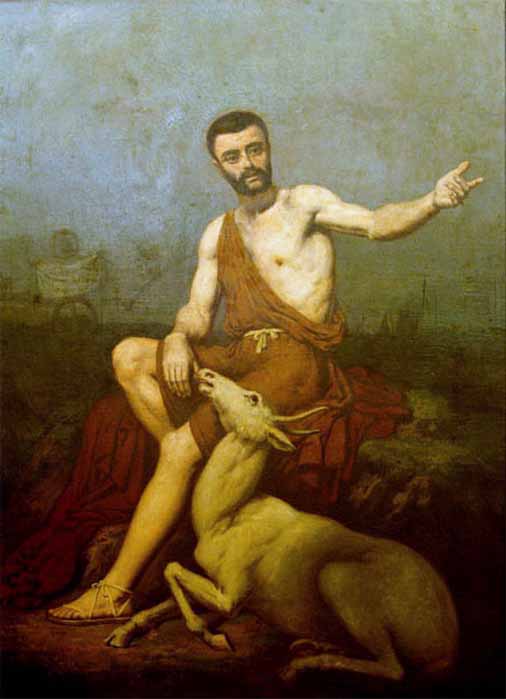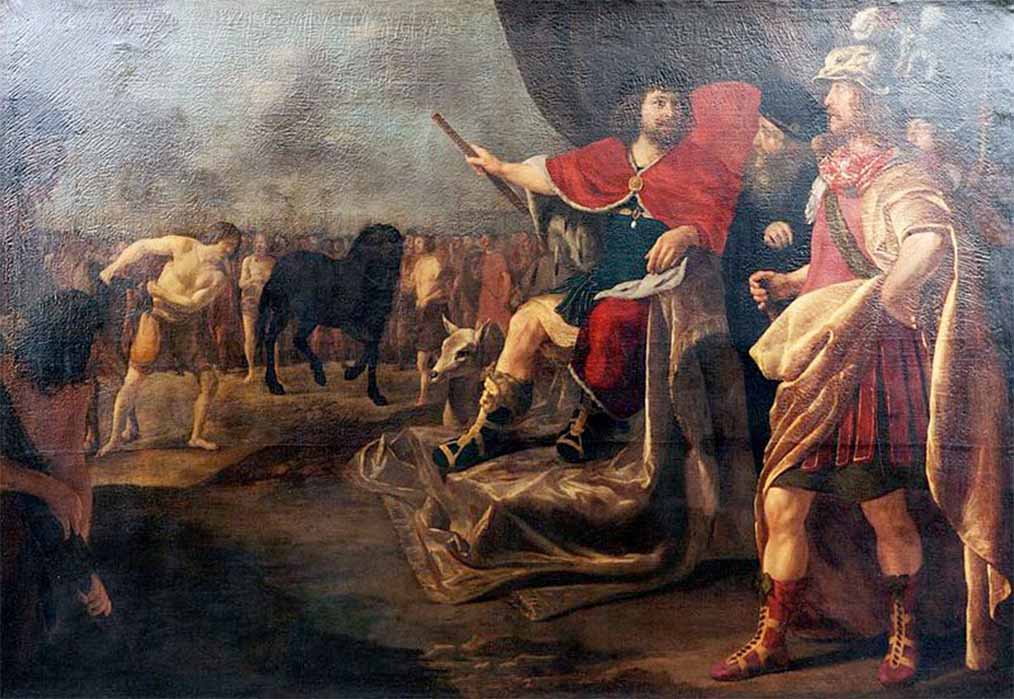
Elephants, Eels, Fawns and Ravens: Ancient Lives Of Beloved Exotic Pets
Unlike Aristotle who viewed animals as irrational creatures with lower moral standing, sent to earth solely to serve humans, Pythagoras regarded them highly and proposed that animals had reincarnated human souls. When Pythagoras saw someone beating a dog, he told him to stop because he recognized a friend's voice in the yelping of the dog. Following the philosophy of Pythagoras, it is no surprise that animals and humans have coexisted for centuries. Archaeologists have discovered the earliest evidence of domesticated dogs in the Middle East at the ancient temple of Gōbekli Tepe in Turkey, which dates between approximately 9500 and 8000 BC. Footprints of a young child walking alongside a dog have been preserved in the earth for more than 25,000 years at the Chauvet Cave in southern France.

Sertorius and his white fawn by Léon Pallière (1849) (Public Domain)
Exotic Pets Of Roman Emperors
Quintus Sertorius (c. 126 – 73 BC) was a powerful Roman general and statesman who had lived an eventful life. In 80 BC, Sertorius went rogue and led a large-scale rebellion against the Roman Senate on the Iberian Peninsula. He defeated various commanders sent by Rome to subdue him on multiple occasions with the support of the majority of the native Iberian tribes. However, the general had a gentler side. Ancient writers such as Pliny, Plutarch, Aulus Gellius, Appian and Frontinus all mention that Sertorius had a white fawn as a pet, that was given to him as a gift. He was pleased with the fawn and had it tied to his tent where he patiently cared for it. The fawn was eventually tamed, and he allowed it to follow him around camp. The fawn complied with his commands as it came when Sertorius called and walked away when Sertorius told it to walk away. The fawn was so well-behaved that the noise of the camp and the thousands of soldiers did not bother it. It only listened to Sertorius.

Quintus Sertorius with his fawn at his feet by Gerard van Kuijl (1638) Netherlands Institute for Art (Public Domain)
Exploiting the superstitions of the soldiers and tribes around him, Sertorius promoted his fawn as a magical conduit to the gods. He claimed that his fawn possessed prophetic abilities because it was sent to him by the goddess Diana herself. Unfortunately for Sertorius, the fawn did not warn him that his general Marcus Perpenna Vento would assassinate him at a banquet, effectively ending the Sertorian War in 72 BC.
Sertorius was not the only powerful man in the ancient world who kept an animal as a pet. Roman emperors Domitian and Caracalla were known to keep lions in their palaces. Caracalla's beloved lion, Acinaces, even ate with him at the table and slept in his master's chamber. Valentinian I entrusted two she-bears, Mica Aurea (Gold Flake) and Innocentia (Innocence), to his servants. Later, he gave the she-bears away as gifts to intimidate his enemies. Caligula kept a horse named Incitatus that slept in an ivory manger. Slaves were even provided for Incitatus. They were tasked with making the horse as comfortable as possible. Incitatus also had his own furniture, plush purple blankets to keep him warm and a jeweled necklace made of the finest stones. Later, after becoming increasingly dissatisfied with the Roman senate, Caligula planned to make Incitatus an official consul and give him the authority to negotiate with foreign dignitaries.

Caligula and Incitatus by Victor Adam (1867) (Public Domain)




